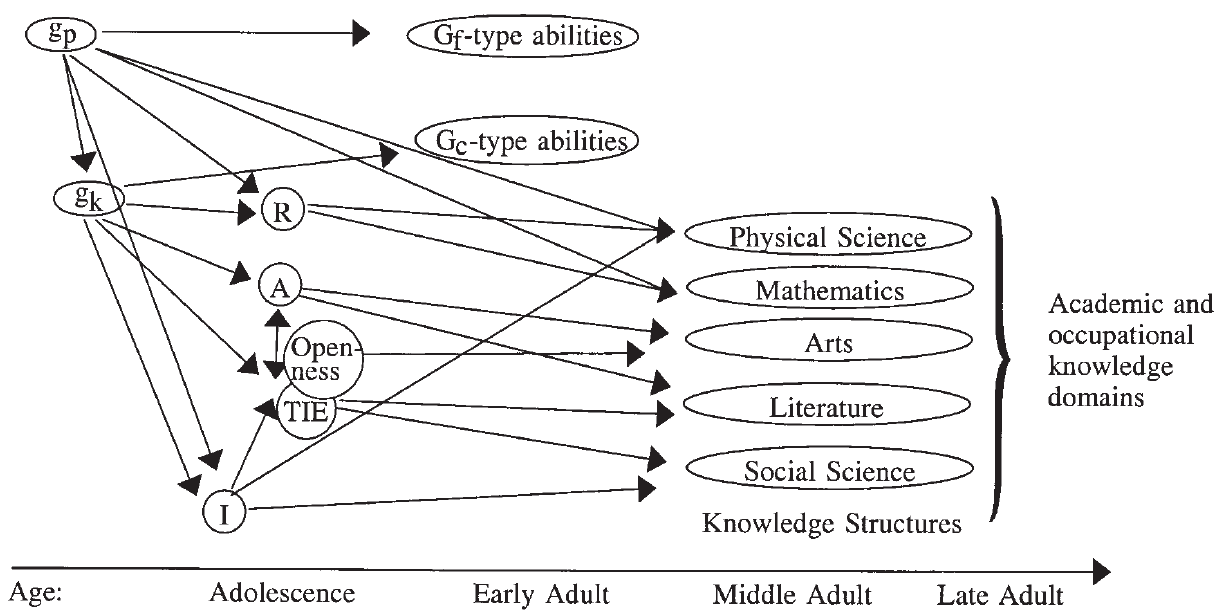
gp = intelligence-as-process
gk = intelligence-as-knowledge
R = Realistic interests
A = Artistic interests
I = Investigative interests
TIE = Typical Intellectual Engagement
gf = fluid intelligence
gc = crystallized intelligence
Illustration of Ackerman’s PPIK theory, outlining the influences of intelligence-as-Process, Personality, Interests, and intelligence-as-Knowledge during adult development, covering academic and occupational knowledge.
The representation indicates that measured fluid intelligence (Gf) develops out of intelligence-as-process (gp), and that measured crystallized intelligence (Gc) develops out of (or is a consequence of) intelligence-as-knowledge (gk).
Interests (Realistic, Investigative, and Artistic) and personality traits (Openness and TIE) are influenced by intelligence to some degree, and in turn, influence knowledge.
Self-care in marriage keeps partners taking small steps that add up
…many intellectually demanding tasks in the real world cannot be accomplished without a vast repertoire of declarative knowledge and procedural skills. The brightest (in terms of IQ) novice would not be expected to fare well when performing cardiovascular surgery in comparison to the middle-aged expert, just as the best entering college student cannot be expected to deliver a flawless doctoral thesis defense, in comparison to the same student after several years of academic study and empirical research experience. In this view, knowledge does not compensate for a declining adult intelligence; it is intelligence!
Moreover, the importance of personality and interests as determinants of the direction and amount of effort expended in the acquisition and maintenance of intelligence-as-knowledge should not be underestimated. Small correlations at the micro-level, when aggregated as influence over time…, may help us predict and understand why some adults continue to acquire knowledge in particular areas and others do not.[1]
Self-care in marriage lets partners build optimism
Explanatory style is the habitual way in which people explain the bad events that befall them… Three dimensions of these explanations are of interest: stability versus instability, globality versus specificity, and internality versus externality.
A stable cause invokes a long-lasting factor (“it’s never going to go away”), whereas an unstable cause is transient (“it was a one-time thing”).
A global cause is one that affects a wide domain of activities (“it’s going to ruin everything I do”), whereas a specific cause is circumscribed (“it has no bearing on my life”).
Finally, an internal cause points to something about the self (“it’s me”), whereas an external cause points to other people or circumstances (“it’s the heat in this place”).
Pessimistic explanatory style (the belief that bad events are caused by stable, global, and internal factors) predicted poor health at ages 45 through 60, even when physical and mental health at age 25 were controlled. Pessimism in early adulthood appears to be a risk factor for poor health in middle and late adulthood.[2]
Self-care in marriage makes partners more happy and well
The seven protective factors that distinguish the happy-well from the sad-sick are under at least some personal control.
Self-care increases happiness and wellness
| Odds ratios of happy-well to sad-sick or dead | ||
| Variable | College men age 75-80 | Core-city men age 65-70 |
| No alcohol abuse | very high | 4.56 to 1 |
| Without depressive diagnosis | 10.4 to 1 | 3.51 to 1 |
| Smoking <30 pack-years | 4.81 to 1 | 4.56 to 1 |
| Some regular exercise | 3.09 to 1 | unknown |
| Body mass index >21 and <29 | 3.05 to 1 | 1.71 to 1 |
| Mature defenses | 2.65 to 1 | 2.98 to 1 |
| Stable marriage | 1.94 to 1 | 2.75 to 1 |
| Parental social class | 1.46 to 1 | 1.12 to 1 |
| Education | unknown | 0.86 to 1 |
| Ancestral longevity | 1.00 to 1 | 1.00 to 1 |
| Warmth of childhood | 0.98 to 1 | 0.99 to 1 |
| Childhood temperament | 0.92 to 1 | 1.10 to 1 |
[3]
Self-care in marriage makes partners more positive and connected
To be well psychologically is more than to be free of distress or other mental problems. It is to possess positive self-regard, mastery, autonomy, positive relationships with other people, a sense of purposefulness and meaning in life, and feelings of continued growth and development.[4]
- Ackerman, Phillip L. “Domain-Specific Knowledge as the “Dark Matter” of Adult Intelligence: Gf/Gc, Personality and Interest Correlates.” Journal of Gerontology: Psychological Sciences 55.2 (2000): P69-P84.
- Peterson, Christopher, Martin E. P. Seligman, and George E. Vaillant. “Pessimistic Explanatory Style Is a Risk Factor for Physical Illness: A Thirty-Five-Year Longitudinal Study.” Journal of Personality and Social Psychology 55.1 (1988): 23-27.
- Vaillant, George E., and Kenneth Mukamal. “Successful Aging.” American Journal of Psychiatry 158.6 (2001): 839-847.
- Ryff, Carol D. “Psychological Well-Being in Adult Life.” Current Directions in Psychological Science 4.4 (1995): 99-104.